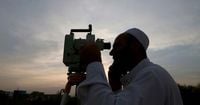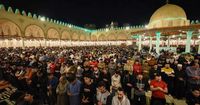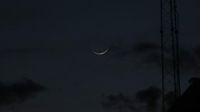As the holy month of Ramadan comes to a close, millions of Muslims around the globe are eagerly anticipating the arrival of Eid-ul-Fitr, a festival that signifies the end of a month-long fast. In 2025, the celebration is expected to take place on either March 30 or March 31, contingent upon the sighting of the crescent moon.
The month of Ramadan began in India on March 2, 2025, following the sighting of the crescent moon on March 1. In contrast, Saudi Arabia commenced Ramadan a day earlier, on March 1. This discrepancy in start dates will affect when Eid-ul-Fitr is celebrated in different countries.
For those in India, the moon sighting on March 30 is critical. If the crescent moon is visible that evening, Eid will be celebrated on March 31. However, if the moon is not sighted, the festival will be observed on April 1. As for Saudi Arabia, the crescent moon is anticipated to be sighted on March 29. Should the moon be seen, Eid will be celebrated on March 30; if not, it will be observed on March 31 in Saudi Arabia and April 1 in India.
The significance of moon sighting in determining the date of Eid-ul-Fitr cannot be overstated. The Islamic calendar is lunar, meaning that each month begins with the sighting of the crescent moon. This year, the International Astronomy Centre in Abu Dhabi has stated that it will not be possible to see the crescent moon in many countries, including the Middle East, on March 29. Therefore, they predict that Eid will likely be celebrated on March 31.
Meanwhile, the Supreme Court of Saudi Arabia has called for individuals to report any sightings of the crescent moon on March 29. This traditional practice involves both naked-eye sightings and observations through telescopes. The court emphasized that anyone who sees the moon should contact the nearest court to register their testimony.
As the festival approaches, the anticipation is palpable. Eid-ul-Fitr, which translates to "Festival of Breaking the Fast," is a time for family gatherings, prayers, and festive meals. It is one of the five pillars of Islam and holds immense spiritual significance. Muslims around the world come together to celebrate the successful completion of Ramadan with communal prayers, charity, and joyous feasts.
In the UK, many Muslims rely on the moon sightings from Saudi Arabia and Morocco to determine the date of Eid. However, there has been a growing call for local moon sightings, leading to potential discrepancies in celebration dates across different regions. This year, the divide was evident as some communities began Ramadan on March 1 while others started on March 2.
Experts in the UK, including Dr. Zahid Nawaz, have advised Muslims to be cautious about predictions regarding the moon sightings. According to the UK's Nautical Almanac Office, the crescent moon is not expected to be visible on March 29, suggesting that Eid would fall on March 31 instead. This aligns with predictions from the International Astronomy Centre, which has also indicated that the moon will be easily visible the following day.
Despite these scientific forecasts, many anticipate that Saudi Arabia will declare Eid on March 30, following their predetermined Umm al-Qura Islamic calendar. This has led to skepticism among astronomers and moon-sighting experts who argue that the moon's visibility does not align with the lunar calendar's predictions.
As families prepare for the festivities, the spirit of Eid-ul-Fitr is marked by joy and generosity. Traditional practices include wearing new clothes, sharing meals, and giving gifts, especially to children. The day begins with communal prayers, where worshippers gather in mosques to celebrate together.
In Saudi Arabia, the Ministry of Human Resources and Social Development has announced a four-day holiday for the private sector and non-profit organizations starting from March 29, allowing workers to enjoy the festivities. Similarly, the UAE government has also declared public holidays depending on whether Ramadan is observed for 29 or 30 days.
For those observing Ramadan in neighboring countries like Pakistan and Bangladesh, the celebration of Eid will likely occur on April 1, following the same pattern of moon sightings as India.
As the final days of Ramadan unfold, the excitement builds for Eid-ul-Fitr, a celebration that brings together communities in a shared expression of faith and unity. The anticipation of the crescent moon sighting adds an element of suspense, as millions await confirmation of the festival's date.
In summary, Eid-ul-Fitr 2025 is set to be celebrated either on March 30 or March 31, depending on the moon sighting. With the importance of this event resonating across the globe, Muslims are preparing to come together in prayer, celebration, and acts of charity, marking the end of Ramadan and the beginning of a new month in the Islamic calendar.









